 Petzlover
Petzlover Hellenic Hound is originated from Greece but Russo-European Laika is originated from Russia. Both Hellenic Hound and Russo-European Laika are having almost same height. Both Hellenic Hound and Russo-European Laika are having almost same weight. Both Hellenic Hound and Russo-European Laika has same life span. Both Hellenic Hound and Russo-European Laika has almost same litter size. Both Hellenic Hound and Russo-European Laika requires Low Maintenance.
Hellenic Hound is originated from Greece but Russo-European Laika is originated from Russia. Both Hellenic Hound and Russo-European Laika are having almost same height. Both Hellenic Hound and Russo-European Laika are having almost same weight. Both Hellenic Hound and Russo-European Laika has same life span. Both Hellenic Hound and Russo-European Laika has almost same litter size. Both Hellenic Hound and Russo-European Laika requires Low Maintenance.
 Developed in Southern Greece, the Hellenic Hound was bred to hunt hare and is an ancient breed. It is a medium sized breed with strong scent and tracking skills. It is believed to have been in existence for thousands of years. The ancestry of the breed included the Lagonikoi or laconikoi, native to southern Greece in ancient times. The breed was spread by sailors on Greece trading ships and colonization.
Developed in Southern Greece, the Hellenic Hound was bred to hunt hare and is an ancient breed. It is a medium sized breed with strong scent and tracking skills. It is believed to have been in existence for thousands of years. The ancestry of the breed included the Lagonikoi or laconikoi, native to southern Greece in ancient times. The breed was spread by sailors on Greece trading ships and colonization.
Todays Hellenic Hound is found throughout Europe. Kept somewhat isolated by the mountains, the breed was protected from outside breeding and they remained pure for centuries. It is a fearless, smart and hyped up purebred. The Hellenic Hound needs to have a job and if you don’t give him one, he will find one. He is smart and independent which sometimes makes him stubborn. It also takes this dog longer to mature than others, sometime between two and three years. It is not good for first time owners. Today’s hound is still a popular hunting dog and companion animal as well. They are rarely seen outside of the Greek country.
In 1996 the Hellenic Hound was recognized as the first Greek dog breed into the FCI. They are not recognized by the AKC. Its numbers continue to decline.
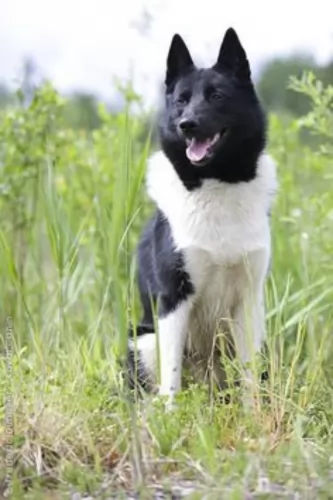 The Russo-European Laika is a hunting dog that comes from Russia.
The Russo-European Laika is a hunting dog that comes from Russia.
It is a dog that has been developed from Spitz type dogs. A breeding program was started for the dog in 1944.
The Russo-European Laika dog is recognized by the Federation Cynologique Internationale in the Spitz and Primitive type group.
 Today’s Hellenic Hound is not a big dog but rather very average or medium. It is an athletic dog and looks like it. It has a balanced body with a deep chest and thick neck. It has medium height legs that are strong and muscular with paws that are prepared for the terrain it always works on. Its coat is short and tight. The colors of the Hellenic Hound are black with tan or white on the chest. Their heads are noble and rounded with a rectangle shaped muzzle. They have v shaped, long ears and round eyes. Their toe nails are black and so is their nose. It has excellent scent glands, very quick responses, speed and stamina. Their tail is thick and tapers off.
Today’s Hellenic Hound is not a big dog but rather very average or medium. It is an athletic dog and looks like it. It has a balanced body with a deep chest and thick neck. It has medium height legs that are strong and muscular with paws that are prepared for the terrain it always works on. Its coat is short and tight. The colors of the Hellenic Hound are black with tan or white on the chest. Their heads are noble and rounded with a rectangle shaped muzzle. They have v shaped, long ears and round eyes. Their toe nails are black and so is their nose. It has excellent scent glands, very quick responses, speed and stamina. Their tail is thick and tapers off.
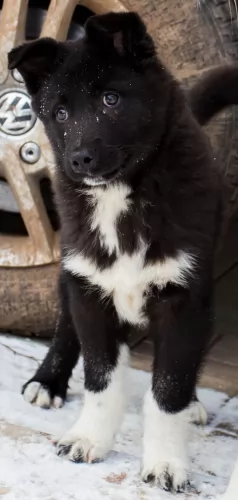 The Russo-European Laika is a medium sized dog Spitz dog that stands at between 54 to 60cm in height and weighs in the region of 20 – 23kg.
The Russo-European Laika is a medium sized dog Spitz dog that stands at between 54 to 60cm in height and weighs in the region of 20 – 23kg.
The dog has quite a strong resemblance to the Karelia Bear Dog. They are sometimes mistaken for each other.
The Russo-European Laika has the typical triangular shaped head with small dark eyes, a black nose and erect, pointed ears. These are deep chested dogs.
As with other Spitz breeds, this dog has a thick fur with a densely furred tail which is curved over the back. The double coat is fairly long and usually a dark grey color or black with some white markings. Sometimes the dog has a white coat.
This is a lively, energetic dog breed that loves to spend time outdoors. It has always been used to alert hunters to prey, using its bark to alert the hunter.Training and socialization will be necessary for the dog if you don’t want it to be barking in the house too.
He makes an excellent guard dog, protecting his human family. It is very tolerant of children too, getting on well with them as well as other pets.
The dog is known for being totally devoted to its family, being an affectionate and loyal breed that doubles as a family pet and guard dog.
 yes, they are very fond of children as long as they are carefully socialized.
yes, they are very fond of children as long as they are carefully socialized.
Great hunter, stamina ,scent, voice
He needs to have a yard or land. He doesn’t do well in apartments.
The breed is very intelligent and can be very trainable. However, they can also be stubborn and that makes training harder.
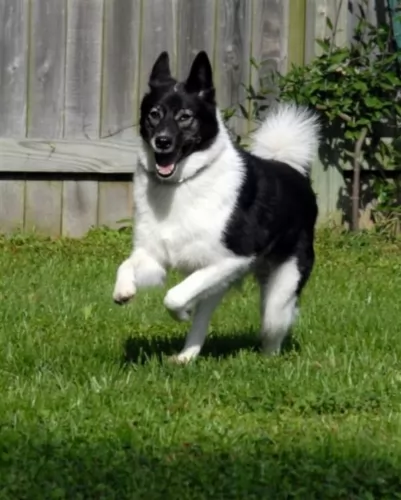 This is an intelligent dog breed, loving the time he spends with his human family but reluctant to be patted by strangers.
This is an intelligent dog breed, loving the time he spends with his human family but reluctant to be patted by strangers.
They also get along with pets that they have grown up with. They get on well with kids and make great watchdogs too. Small wonder they make such sought after pets and companions.
 The Hellenic Hound is a fairly healthy breed having been isolated on the Island of Greece for the most part. They are susceptible to:
The Hellenic Hound is a fairly healthy breed having been isolated on the Island of Greece for the most part. They are susceptible to:
Could be hips, elbows or knees. If untreated can lead to lameness or inability to walk.
Causes joint pain and can cause lameness or inability to walk.
Can be fatal if not treated immediately. To avoid it don’t feed a large meal before or after exercise.
Can be a variety of things that occur during the hunt.
Need to keep the ears clean and dry in order to avoid infections.
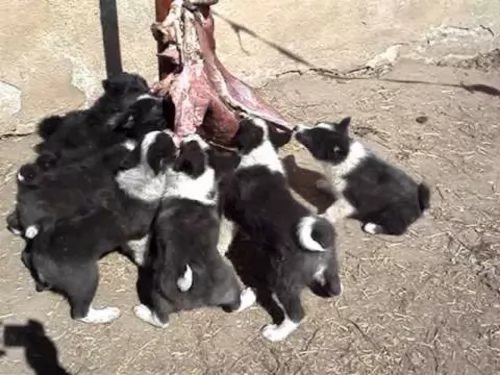 These Spitz type dogs are always known to enjoy good health, and owners don’t have to worry too much about their health as only a small number of health issues are reported with this healthy dog breed.
These Spitz type dogs are always known to enjoy good health, and owners don’t have to worry too much about their health as only a small number of health issues are reported with this healthy dog breed.
This is a congenital defect in the abdominal muscles and can result in fat or tissues being evident under the skin. A bulge is often seen in the area of the abdomen. Larger hernias will require surgery.
 Feed the puppy 2-3 times a day a total of 2 cups
Feed the puppy 2-3 times a day a total of 2 cups
Feed the adult twice a day a total of 2-3 cups
The Hellenic Hound has excellent stamina, speed and scenting ability.
This is a very active, athletic dog that needs to work and needs exercise. He is powerful, quick and has great endurance. It thrives on hunting but will need other activities on the days it doesn’t hunt. It needs a yard or land to play in. Agility, Field Trials, tracking, hunting and fly ball are all activities the Hellenic Hound will enjoy.
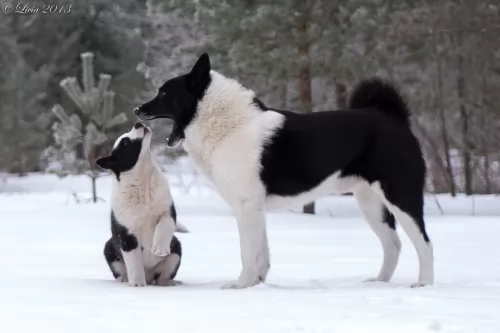 This is an energetic dog and will require a good amount of excerise. This dog isn’t suited to living in the city as they are highly active. Apart from wanting large grounds to run around in, he will need walks as well as ball- and rope games to keep him busy.
This is an energetic dog and will require a good amount of excerise. This dog isn’t suited to living in the city as they are highly active. Apart from wanting large grounds to run around in, he will need walks as well as ball- and rope games to keep him busy.
He is intelligent and needs some form of mental stimulation. There are good quality toys which one can buy for these dogs than can make them think.
Many things can change a dog’s longevity, and diet is one. A good nutritious diet with vitamins and minerals will give your dog less of a chance to get sick.
If you go for the best quality commercially manufactured dog foods, you’ll find that they are both convenient and well balanced.
To provide your dog with just a bit of variety in his diet, some home-made food added into the dry kibble from time to time will delight your pet.
No need to make preparing the food a huge issue either. Boil brown rice and chicken in a pot and add in sweet potatoes, carrots and spinach. Chop all this up and add small portions of it into the dry kibble.
Try to include a bit of raw meat occasionally and never let your dog be without a constant source of fresh, cool water